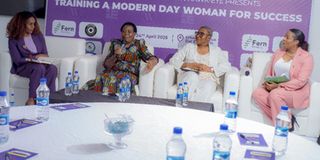Experts outline factors hindering growth of corporate women

The University of Dar es Salaam’s Faculty of Education, Prof Eustella Bhalaluseda, speaks on Thursday, April 24, 2025, during the official launch and inaugural seminar of Women Leadership in Insurance Africa (WLIAfrica). Looking on are PwC Associate Director in the Tax Department, Ms Jonia Kashalaba (left); Bank of Africa Head of Marketing and Communication, Ms Nandi Mwiyombella (second right); and WLIAfrica Country Director, Ms Lorna Mbwete (right). PHOTO | COURTESY
What you need to know:
- WLIAfrica currently boasts over 200 members from more than 30 countries across Africa and the diaspora.
Dar es Salaam. The growth of corporate women in Africa is hindered by a range of factors, including limited strategic investment, inadequate income-generation opportunities, and poor financial management.
Other challenges include insufficient education on self-awareness, work-life balance, navigating workplace dynamics, personal branding, mental health, and family lifestyle.
These concerns were at the forefront during the official launch and inaugural seminar of Women Leadership in Insurance Africa (WLIAfrica).
This is a pioneering network dedicated to empowering female professionals in the insurance and related industries across the continent.
During the event on Thursday, April 24, 2025, a certified financial educator, Mr Edmund Munyangi, underscored the importance of financial literacy among women, noting that many remain trapped in cycles of debt due to excessive reliance on loans.
He said this undermines their ability to engage in productive, income-generating activities and manage their corporate responsibilities effectively.
“Women must understand that access to loans doesn’t mean one should borrow indiscriminately. It is vital to have a clear plan and a strong understanding of how to invest borrowed funds—and, similarly, how best to manage their savings,” advised Mr Munyangi.
He also encouraged women to explore their passions when seeking additional income streams.
“For corporate women looking to diversify, it’s essential to invest in what you love. Passion-driven investment often leads to long-term success,” he added.
WLIAfrica Country Director, Ms Lorna Mbwete, said that the forum, organised in partnership with Hawak-Eye Company Limited, aimed to create an inclusive space where women can build meaningful relationships, enhance their leadership skills, and drive positive change in their respective fields.
“This platform was initially created for women in insurance, as they are the founders. However, women from all sectors are welcome to apply and become members,” she said.
“We offer tailored packages for Next-Gen and Senior Professionals, including training, mentorship, and career coaching programmes to support growth and success,” she added.
She further explained that WLIAfrica’s initiatives include monthly interactive sessions on industry-relevant topics, alongside the WLIAfrica Fellowship—an annual, six-month immersive leadership programme for selected members.
The fellowship provides access to leadership development, mentorship, training opportunities, conferences, exclusive events, and a network of like-minded professionals.
Among the attendees was Ms Zena Kalakamwe, a teacher at Al-Irshaam International School, who said she gained valuable insights into self-awareness and how to make a positive impact on others both professionally and personally.
WLIAfrica currently boasts over 200 members from more than 30 countries across Africa and the diaspora.
These include Benin, Botswana, Cameroon, Congo, Côte d'Ivoire, Egypt, Eswatini, Ethiopia, Gambia, Ghana, Guinea, Kenya, Madagascar, Malawi, and Mauritius.
Others are Mozambique, Nigeria, Rwanda, Senegal, South Africa, Swaziland, Tanzania, Togo, Tunisia, Uganda, Zambia, and Zimbabwe, as well as diaspora communities in Canada, India, Slovakia, Sweden, and the United States.




